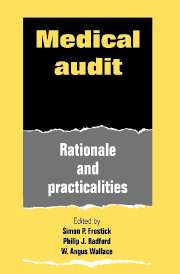Book contents
- Frontmatter
- Contents
- List of contributors
- Foreword
- Foreword
- 1 Introduction
- 2 Audit: historical and future perspectives
- 3 Audit philosophy
- 4 Medical audit: a view from the centre
- 5 Audit: a view from the Royal College of Surgeons of England
- 6 The regional viewpoint
- 7 Medical audit: the needs of the District Health Authorities
- 8 Resource management and budget holding
- 9 Unit and district information systems
- 10 Read codes and medical audit
- 11 Data capture direct from doctors
- 12 Computer systems: practice, limitations and pitfalls
- 13 Paediatric audit
- 14 Audit in obstetrics and gynaecology
- 15 Audit in general surgery
- 16 Orthopaedic audit: guidelines and hints
- 17 Installing audit in general practice and general dental practice
- 18 Clinical audit in psychiatry. Models for audit in mental health
- 19 Audit in anaesthesia
- 20 Audit in intensive care
- 21 Medical audit: lessons from the USA
- 22 Quality control in health care: the Dutch experience
- 23 Medical audit: experience from Sweden
- 24 Performance indicators
- 25 Measuring outcome and quality control
- 26 Audit: will it work?
- 27 What has been achieved so far?
- 28 A practical guide to audit
- Index
2 - Audit: historical and future perspectives
Published online by Cambridge University Press: 30 September 2009
- Frontmatter
- Contents
- List of contributors
- Foreword
- Foreword
- 1 Introduction
- 2 Audit: historical and future perspectives
- 3 Audit philosophy
- 4 Medical audit: a view from the centre
- 5 Audit: a view from the Royal College of Surgeons of England
- 6 The regional viewpoint
- 7 Medical audit: the needs of the District Health Authorities
- 8 Resource management and budget holding
- 9 Unit and district information systems
- 10 Read codes and medical audit
- 11 Data capture direct from doctors
- 12 Computer systems: practice, limitations and pitfalls
- 13 Paediatric audit
- 14 Audit in obstetrics and gynaecology
- 15 Audit in general surgery
- 16 Orthopaedic audit: guidelines and hints
- 17 Installing audit in general practice and general dental practice
- 18 Clinical audit in psychiatry. Models for audit in mental health
- 19 Audit in anaesthesia
- 20 Audit in intensive care
- 21 Medical audit: lessons from the USA
- 22 Quality control in health care: the Dutch experience
- 23 Medical audit: experience from Sweden
- 24 Performance indicators
- 25 Measuring outcome and quality control
- 26 Audit: will it work?
- 27 What has been achieved so far?
- 28 A practical guide to audit
- Index
Summary
Historical aspects
‘Audit can be defined as a hearing; especially a judicial hearing of complaints or a judicial examination or an official examination of accounts with verification by reference to witnesses and vouchers, or a judgement upon any matter, a critical evaluation. An auditor is one who learns by aural instruction, one who listens judicially and tries cases as in the Audience Court of 1640. However, quality Assurance is the quality of a person or of a character, deposition, nature, capacity and ability of skills and things; an attribute property which specifically features the degree or grade of excellence possessed by a thing. Assurance is a promise making a thing certain, with the intention of insuring and securing the value of things’ (from The Shorter Oxford English Dictionary on Historical Principles, 1980).
Historically, audit has been carried out for many centuries, beginning with the development of national statistics of births and deaths in the Domesday Book of 1066, the Parish Registers of 1597, the Population Act of 1840 and the first National Population Census in 1801. To improve upon earlier attempts required the development of statistics as a science, beginning with the formation of the Statistical Society of London in 1833.
- Type
- Chapter
- Information
- Medical Audit , pp. 5 - 17Publisher: Cambridge University PressPrint publication year: 1993

